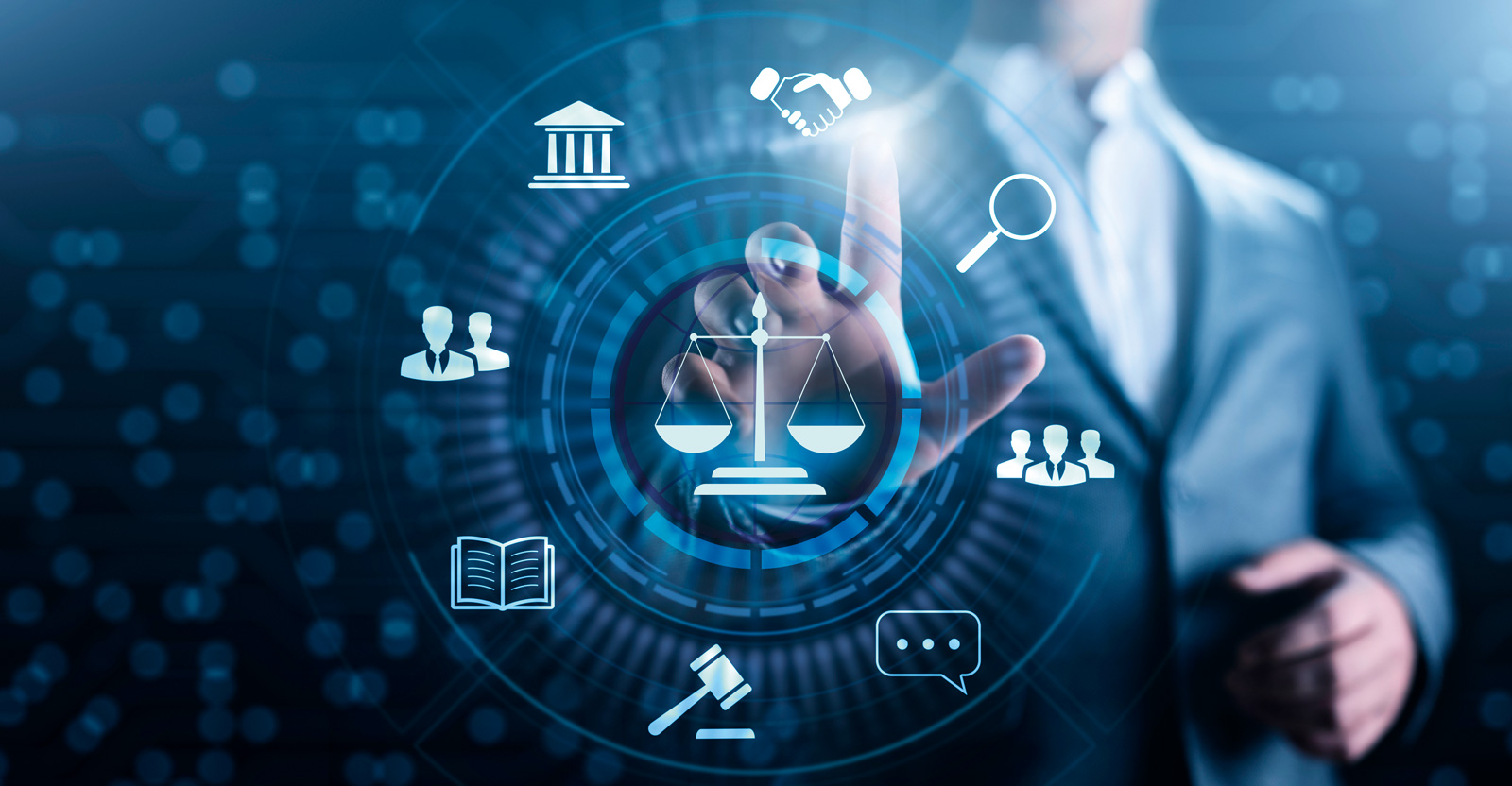In an era defined by rapid technological advancements and global interconnectivity, the synergy between the rule of law, sustainable development, and innovation has never been more critical. It is of utmost importance that we delve into the intricate dynamics that bind these pivotal elements, in order to discover their collective impact on societal progress and stability. This exploration seeks to uncover how robust legal frameworks, forward-thinking development strategies, and cutting-edge innovations can collaboratively forge a path toward a more just, prosperous, and innovative future.
In line with AmCham Greece’s upcoming Rule of Law 2024 Conference, which will be held this June under the auspices of Her Excellency the President of the Hellenic Republic, Katerina Sakellaropoulou, we have asked this issue’s Thought Leaders to reflect on the importance of the rule of law and its contribution to development and prosperity, as well as on other current topics such as the effect of AI and innovation on judicial services and the ways in which corporate governance can support rule of law principles in business. Read on to find out what our Thought Leaders had to say.

The Rule of Law and Its Contribution to Development and Prosperity
The rule of law is a foundational principle that underpins the functioning of just societies worldwide. Its significance extends far beyond mere legal frameworks, as it plays a pivotal role in fostering development and prosperity within nations and contributes to essential aspects of societal advancement.
First and foremost, the rule of law provides a stable and predictable legal environment, essential for fostering economic growth and investment. In societies where laws are transparent, consistently enforced, and applied impartially, businesses can operate with confidence, knowing that their rights and contracts are protected. This fosters a conducive environment for entrepreneurship, innovation, and the efficient allocation of resources, all of which are crucial drivers of economic development. Moreover, the rule of law safeguards individual rights and liberties, ensuring that citizens are treated fairly and equally before the law. This creates a sense of trust in institutions and encourages civic participation and engagement. When people have confidence in the legal system to protect their rights and hold accountable those who violate them, they are more likely to invest in their communities, participate in democratic processes, and contribute positively to societal progress.
The rule of law lays the foundation for sustainable growth and progress
Furthermore, the rule of law helps prevent corruption and fosters accountability among public officials. In societies where laws are enforced consistently and transparently, there is less room for abuse of power and misuse of public resources. Strong legal institutions, coupled with effective checks and balances, serve as a deterrent to corruption and promote integrity in governance. This not only enhances public trust in institutions but also ensures that resources are allocated efficiently, benefiting the overall welfare of society. Additionally, the rule of law promotes social stability and cohesion by providing a framework for resolving disputes timely and fairly. This contributes to a more harmonious and orderly society, conducive to longterm development and prosperity.
The rule of law also facilitates international cooperation and trade by providing a common framework of legal norms and standards. In an increasingly interconnected world, where trade and investment flow across borders, adherence to international legal principles is essential for fostering trust and cooperation among nations. Countries that uphold the rule of law are more likely to honor their international commitments and engage in mutually beneficial trade relationships.
In conclusion, the rule of law is an indispensable condition for fostering development and prosperity within societies. By providing a stable legal environment, safeguarding individual rights, promoting accountability, fostering social cohesion, and facilitating international cooperation, the rule of law lays the foundation for sustainable growth and progress. As such, it is imperative for policymakers and stakeholders to prioritize the promotion and protection of the rule of law as a cornerstone of societal advancement.


The Indispensable Role of International Arbitration and Alternative Dispute Resolution
In the global legal landscape, international arbitration and alternative dispute resolution are essential mechanisms that foster certainty and stability in international trade and investment. They provide a robust framework for resolving disputes that transcend national boundaries, respecting the cultural and legal differences between the parties involved.
International arbitration traditionally offers a neutral forum for dispute resolution, particularly beneficial in cross-border disputes where parties may be wary of potential bias when litigating before foreign courts. It provides a degree of control over the process, allowing parties to select arbitrators and agree on procedural rules. In the realm of international business, the importance of such a neutral and controlled environment cannot be overstated. International arbitration provides this environment, fostering a sense of security and trust among international businesses. The enforcement of international arbitral awards under the 1958 New York Convention (NYC), a key instrument developed with the support of UNCITRAL, further enhances this sense of security.
International arbitration and ADR connect the rule of law, development, and innovation
A key feature1 of international arbitration is its consent-based limitations. Parties voluntarily agree to arbitrate (even if sometimes without privity of contract), defining the scope of the arbitration agreement and the powers of arbitrators. This consent-based nature is fundamental to the legitimacy and enforceability of the arbitration process. Another notable feature is the confidentiality of arbitral awards. Arbitral awards are not typically made public, providing a level of privacy that is generally desirable in commercial disputes. Conversely, in the investor-state and state-to-state space, confidentiality will often stay on the sidelines to make room for transparency. The practice of party appointment of arbitrators is a unique aspect of international arbitration. It allows parties to have a say in who will decide their dispute, potentially increasing their confidence in the process. Yet, this practice is often criticized for potentially compromising the impartiality of the arbitral tribunal.
International arbitration operates under the principle that “there is no right to a right answer.” This means that arbitral tribunals do not set legal precedents, and each dispute is resolved based on its specific facts and the parties’ agreement.
International arbitration is not without its challenges. The increasing costs and delays, attributed to arbitration’s growing procedural rigidity and lack of agility, can impose a significant burden on arbitration users, potentially undermining their confidence in the process. These challenges underscore the need for continuous improvement and adaptation in the field.
On the other hand, alternative dispute resolution (ADR), which encompasses methods such as mediation and conciliation, promotes a collaborative approach to dispute resolution. It encourages parties to find mutually acceptable solutions, preserving relationships and promoting amicable settlement and thereby harmony. The 2020 Singapore Convention on Mediation, another significant UNCITRAL instrument, is expected to make enforcement of ADR-born settlement agreements easier globally, much as the NYC did for arbitral awards.
International arbitration and alternative dispute resolution are not mere tools for resolving disputes; they are bridges connecting the rule of law, development, and innovation. They play a pivotal role in fostering a just, prosperous, and innovative global community. As we navigate the complexities of the 21st century, their role in promoting peace, justice, and prosperity cannot be stressed enough.
1 On the key features of arbitration and their interplay with the rule of law, see Sundaresh Menon, “Arbitration’s Blade: International Arbitration and the Rule of Law,” Journal of International Arbitration, vol. 38, issue 1 (2021): pp. 1-26. https://doi.org/10.54648/joia2021001

The Growing Role of AI in Legal Practice: Benefits, Potential, and Ethical Concerns
Vassilis Ikonomidis, Managing Partner, VDI Law Firm
Over the past few years, generative artificial intelligence (GenAI) has emerged as a transformative force within the legal industry, with high potential to drive innovation and significant change in the field. Despite its challenges, the implementation of this advanced machine learning technology holds substantial promise for the enhancement of the quality and efficiency of legal services, particularly in a rather obsolete legal system.
The embracement of AI has the potential to transform the provision of legal services as we know it. A key benefit is its ability to increase the productivity of legal practitioners by automating time consuming tasks; for instance, AI legal research tools can search through vast databases of legal texts, legislation, and jurisprudence in seconds, thus accelerating legal research and improving efficacy, while AI’s capacity to generate and review a variety of legal documents can effectively reduce the time needed for drafting and proofreading. Al’s benefits also extend to litigation, with AI legal tools able to quickly identify precedence in similar legal cases that could be used to strengthen the argumentation of the case or even generate motions for court proceedings. This capacity has already attracted significant investment from law firms and consulting companies around the world in AI legal tools, with Lexis+ AI, Harvey AI, and CoCounsel AI being just a few examples thereof.
Predictive analysis is another area where AI has proved beneficial, as AI algorithms can analyze historical court case data to predict possible litigation outcomes, thus enabling lawyers to adopt more strategic decisions before initiating proceedings before courts. In that way, predictive analysis could potentially increase out of court settlements and even reduce the number of lawsuits filed before courts. Similarly, the integration of AI into the judicial system could effectively reduce extreme delays in the issuance of court rulings by providing data on court efficiency, case backlogs, and other metrics, allowing for an appropriate distribution of workload to judges and the efficient administration of justice. Finally, in terms of case management, AI could provide invaluable support in document classification and filing by automating routine administrative tasks, which can enhance administrative efficiency.
AI allows legal practitioners to focus on negotiation techniques, critical thinking, and strategy development on higher order legal tasks
Even though it is argued that AI could substitute a great fraction of legal work, this technology actually offers legal practitioners an opportunity to focus more on negotiation techniques, critical thinking, and strategy development on higher order legal tasks. The adoption of AI tools could allow legal practitioners to invest in strengthening client relationships and improving the quality and efficiency of their services. In any case, human intervention will still be required to ensure the accuracy and quality of the data provided by AI legal tools. Yet despite its significant role in accelerating innovation in the legal industry, AI raises ethical concerns with respect to the protection of human rights, privacy, data protection, transparency, and algorithmic bias. To mitigate these risks, it is necessary to develop and adopt an effective regulatory framework that would ensure integrity and fairness in legal practice as well as transparency in decisionmaking.

The EU's Corporate Sustainability Reporting Directive (CSRD): Embracing the Principles of the Rule of Law
Terspihori Magdalinou, Partner, Stavropoulos & Partners Law Office
The European Union is continuously working on promoting sustainable business practices through comprehensive legislation. The Corporate Sustainability Reporting Directive (CSRD) is part of the European Green Deal and one of the EU’s initiatives aimed at enhancing corporate transparency and accountability in environmental, social, and governance (ESG) matters. This directive not only advances sustainability goals but also reinforces the rule of law by supporting its above core principles of transparency and accountability as well as those of legal certainty and the protection of human rights.
The CSRD, which strengthens, updates, and considerably extends the previous EU rules on non-financial and sustainability reporting, requires large companies and listed small and medium-sized enterprises (SMEs) to report on their ESG performance. The directive requires detailed disclosures on how companies impact the environment and society, as well as how they manage sustainability risks, and thus aims to ensure that sustainability information is comparable, reliable, and accessible.
The CSRD contributes to a more transparent, fair, and sustainable business environment
The CSRD supports the principles of transparency and accountability by ensuring that actions are conducted openly and that entities are held responsible for their behaviors. Within this framework, entities are required to provide comprehensive and standardized reporting on ESG factors, including climate change, human rights, and social impacts. This transparency allows all Interested, affected, or relevant parties, including investors, customers, and regulators, to assess a company’s sustainability practices and performance, while such detailed and consistent reporting will also help prevent greenwashing, i.e. will prevent companies from falsely representing their operations as environmentally (or more environmentally) friendly than they actually are. In addition, information about corporate sustainability is readily available to a wide range of stakeholders and thus holds companies accountable for their ESG impacts.
By introducing obligations to companies to report on their ESG initiatives and outcomes, the directive also encourages businesses to adopt more ethical and sustainable practices, minimize their negative environmental and social impacts, and align their operations with broader societal values. The focus on human rights and social factors ensures that companies are not only accountable for their financial performance but also for their contribution to people’s and society’s wellbeing, while reporting on specific business practices that are related to corporate governance—such as preventing corruption and bribery, undertaking engagement in political influence (lobbying), safeguarding whistleblowers etc.—ensures that the company is behaving in a fair and ethical manner when conducting its business.
Legal certainty and harmonization are essential for a fair and predictable legal environment, which the CSRD enhances by harmonizing ESG reporting standards across the EU, allowing businesses to operate within a clear legal framework and under the same standards even if operating in different member states.
Finally, the CSRD establishes a strong framework for monitoring and enforcing compliance, which includes mandatory third-party audits of sustainability reports, penalties for non-compliance, and regular reviews by regulatory bodies. This enforcement mechanism is crucial for maintaining the integrity of the legal system and upholding the rule of law.
As companies align their business and operations with these thorough and strict standards, the CSRD contributes to a more transparent, fair, and sustainable business environment, shielding the principles of the rule of law in the corporate sector.

The Advantages of Arbitration and ADR Over Litigation in National Courts
George Mpakalis, Associate in Machas & Partners Law Firm
More than eight years have passed since the implementation in Greece of Law 4335/2015, which brought about radical changes in civil procedure. The main objective was to speed up the administration of justice. Although there have been subsequent amendments, the results have not been as expected. In the modern era of global trade, where competition is fierce, the well known aphorism “time is money” is more relevant than ever. Recourse to justice, therefore, should not be a hindrance when disputes arise between the parties to a contract. The option of resolving disputes through arbitration and alternative dispute resolution (ADR) methods, such as mediation, is therefore unquestionably the right choice for resolving commercial and investment disputes and relieving the concerned parties from the delay of national courts.
Greece is emerging as an ideal place for conducting arbitration
Following the introduction of Law 5016/2023, Greece is emerging as an ideal place for conducting arbitration by framing the procedure with favorable provisions that respond to modern practical issues. The possibility of conducting arbitrations and ADR under the auspices of recognized domestic and international institutions provide the parties concerned with the necessary guarantees so that they can be confident that their disputes will be resolved under the best possible conditions. Arbitration and ADR are essential mechanisms in the modern legal landscape, offering numerous benefits over traditional litigation; these include:
Preservation of relationships: Many disputes arise in contexts where ongoing relationships are important, such as in business partnerships. ADR methods are designed to be less adversarial than litigation, focusing on collaboration and mutual agreement. This approach helps preserve professional and personal relationships by reducing hostility and fostering cooperative problemsolving. Mediation and negotiation allow parties to actively participate in crafting a mutually acceptable solution, rather than having a decision imposed by a judge. This participatory aspect can lead to more satisfactory outcomes and preserve relationships.
Efficiency, speed, expertise, and confidentiality: One of the primary advantages of arbitration and ADR is the efficiency with which disputes can be resolved. Court cases often take years to conclude due to backlogs and procedural complexities. In contrast, arbitration and other ADR methods such as mediation and negotiation typically involve shorter timelines as they are not bound by the same procedural rules as courts. This expedited process helps parties reach resolutions faster, allowing them to move forward without prolonged legal battles. Flexibility in the formulation of the procedure not only doesn’t detract from the quality of the decision to be taken, but on the contrary, it strengthens it, as the parties are allowed to choose arbitrators with specific expertise relevant to their dispute. This specialization can lead to more informed decisions and greater satisfaction with the outcome. For instance, in complex commercial disputes, having an arbitrator with a deep understanding of the industry can be highly advantageous. Furthermore, these procedures can be confidential. ADR processes are typically private, unlike court proceedings, which are a matter of public record. This confidentiality is crucial for parties concerned about protecting trade secrets, sensitive business information, or personal privacy.
Enforceability and finality: Arbitration awards are generally binding and enforceable in the same manner as court judgments, both domestically and internationally, thanks to treaties such the New York Convention. This finality provides parties with certainty and reduces the likelihood of prolonged appeals, which are common in traditional litigation.
In conclusion, arbitration and alternative dispute resolution offer a range of benefits that address the limitations and inefficiencies of traditional litigation. By providing faster, cost-effective, flexible, and confidential solutions, ADR supports the needs of parties seeking fair and efficient dispute resolution while preserving relationships and ensuring enforceability.






